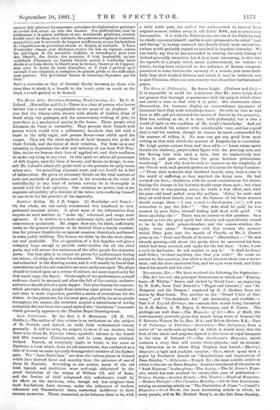Loca Patricians. By the Rev. J. F. Shearman. (hi. H.
Gill, Dublin.)—The author of this volume is an enthusiast on the subject of St. Patrick, and, indeed, on early Irish ecclesiastical history generally. It will be news, we suspect, to most of our readers, that there were three St. Patricks whose apostolic labours in the fourth iihd fifth centuries Christianised, and in some degree civilised, Ireland. Patrick, as everybody ought to know, is the same as Patrician, a term which, from its old associations, was conferred as a title of honour on some specially distinguished member of the Episco- pate. The " Loca Patriciana " are thus the various places in Ireland which have derived fame and sanctity from the presence of one of these St. Patricks. According to our author, many of the old Irish legends and traditions were well-nigh obliterated by the penal legislation of the reigns of William III. and of Anne, and the famine of 1847 completed this unfortunate result by its effect on the survivors, who, though not less religions than their forefathers, have become, under the influences of modern education and Transatlantic. ideas,. somewhat indifferent to their ancient memories. These, connected, as he believes them to be, with
a truly noble past, the author has endeavoured to recover from original sources, hidden away in old Celtio MSS., and so practically inaccessible. It is with the Patrician era, the era of the Patricks, that be chiefly concerns himself ; and he is quite prepared to be called "rash and daring," in having ventured into details which most critical his- torians would probably regard as involved in hopeless obscurity. We can hardly say that he has succeeded in making the early history of Ireland generally attractive, but it is at least interesting to dive into the legends of a people which never (unfortunately, we venture to think), having been subjected to the influence of Roman conquest, preserved in some fashion the memory of a remote past more faith- fully than their kindred Britons, and which, it may be believed, was in part Christian, when our own country was altogether barbarous and pagan.






























 Previous page
Previous page